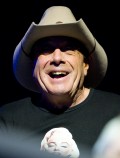We’ve all been told you can’t judge a book by its cover, but a title is a different story and sumdumhonky, the title of Lloyd Price’s memoir (published by Cool Titles, set for October 13, 2015 street date), lets you know it will not be your garden-variety rock star autobiography.
Of course, Lloyd Price is a verifiable rock star. Born in Kenner, Louisiana on March 9, 1933, Lloyd showed musical promise from an early age, playing trumpet and piano in school and, by the time he was in high school, playing around New Orleans in a jazz/R&B combo. He spent what little spare time he had in his mother’s restaurant, the Fish N Fry; it was there, Lloyd says, that he picked up his love for food and business.
More importantly, it was where he was discovered by Dave Bartholomew, a producer and talent scout for Specialty Records. Stopping into the restaurant to grab a bite, he overheard Lloyd working on Lawdy Miss Clawdy. Knocked out by what he heard, Bartholomew signed him, brought him to New Orleans, and put him in the studio with a band that included Fats Domino on piano and Earl Palmer on drums. Lawdy Miss Clawdy spent seven weeks on top of the charts, making Lloyd one of the first teenagers to sell a million records.
Fifteen of his records became top ten R&B hits; they remain just as fresh and exciting today as when they were recorded. His songs have been covered nearly 600 times by artists as diverse as the Beatles, (plus Paul McCartney and John Lennon on solo albums), Elvis Presley, Little Richard, Fats Domino and many more. Lloyd was inducted into the Rock and Roll Hall of Fame in 1998 and the Louisiana Music Hall of Fame in 2010. The city of Kenner honored him with Lloyd Price Avenue, and erected a statue of him in LaSalle Park.
Lloyd’s music has been a mainstay on TV: the #1 hit Personality has been featured in campaigns for General Motors, Kraft Foods, American Idol, the U.S. Army, Fiat, Weight Watchers, Howard Johnson’s Hotels, the PGA and LPGA, NFL Apparel, and Pepsi Cola. Lloyd made his debut as an actor on the first season of the hit HBO series Treme. Still a consistent concert draw, he produced and starred in 4 Kings of Rhythm and Blues alongside Jerry Butler, Gene Chandler, and Ben E. King. From 1999 into the 2000s, the show sold out houses across the country, including the MGM Grand in Las Vegas and New York’s Legendary Apollo Theater. It was recorded for PBS and remains one of their most popular programs.
That would be enough for most people, but in addition to his music career, Lloyd has been a pioneering businessman. He started his own labels (including Double L Records, which released Wilson Pickett’s debut recordings), and was one of the first black Americans to own and operate a nightclub in New York City, Lloyd Price’s Turntable, on 52nd Street and Broadway. He co-produced (with Don King) the famous Ali-Foreman “Rumble in the Jungle,” the accompanying concert and satellite broadcast; developed middle-class housing the blighted South Bronx; manufactured sports equipment (an outgrowth of his youthful interest in athletics, he boxed as Kid Price and was a good enough bowler to rack up six perfect 300 games); and built a thriving food company. All this while continuing to record hits and play an average of 250 concerts a year.
His career gave Lloyd a special insight during the tumultuous Civil Rights movement of the 1950s and 60s. sumdumhonky chronicles how, no matter how successful he became, race was never far from the surface. Even as he was bridging the pop and R&B charts with his music, and he doesn’t stint on stories about his career, including the early days of New Orleans R&B, he found his skin color was an issue.
In sharply detailed prose, as energetic and stylish as his music, Lloyd writes of the racist citizens of his hometown of Kenner, Louisiana, the bigoted police officers, salesmen and record industry executives who figured they could take advantage of him simply because he was black and from the South, and of his eye-opening trip to Africa.
“Times have changed since I was born more than eighty years ago. Blacks can now drink from the same water fountain as white people, eat at the same restaurants, ride in the front on public transportation, get a bank loan, hold jobs in management and we don’t get lynched quite as often as we used to.”
As recent events have shown, race is still a flashpoint in American life.“sumdumhonky is a frank look at the issue, told with heart, style, and of course, “personality.”
——————————————————————————————————————————————
Stay informed with the Noise11.com daily music news email. All your music news in one daily summary Subscribe to the Noise11 Music Newsletter here
Listen to the Noise11 Music News channel now at iHeartRadio
Follow Noise11.com on Facebook and Twitter
more from vvnmusic.com

















